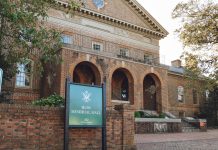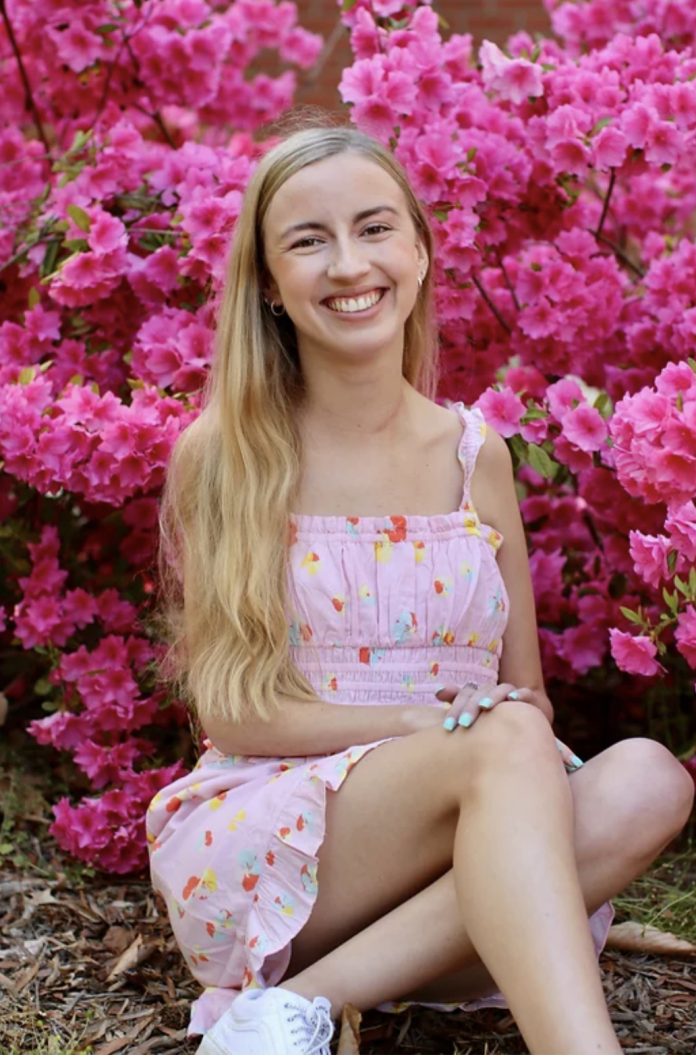Monday, Nov. 13, the College of William and Mary’s Student Accessibility and Disability Alliance hosted a “Disability and Desserts” talk featuring Sarah Todd Hammer, a disability and accessibility advocate. Hammer is a senior and psychology major at Davidson College in North Carolina, and she is heavily involved in the Davidson Disability Alliance, which serves a similar purpose as SADA at the College.
Recently established in the spring of 2023, SADA focuses on raising awareness and promoting advocacy for the disabled community at the College. SADA President Madeline White ’24 chose the speaker for this event after seeing Hammer’s TikTok videos pop up on her feed. White mentioned she was immediately drawn to Hammer’s direct attitude and advocacy for herself and her needs.
“I really wanted to bring someone who had that perspective to William and Mary to help William and Mary students who are disabled feel more confident in doing the same thing,” White said.
Hammer opened her talk by providing background into her disability. She recounted a day in April 2010 when she began suffering severe headaches and experienced paralysis in her arms and hands while in dance class. The next morning, she could not move any part of her body from her neck down. She was then diagnosed with acute flaccid myelitis, an autoimmune disorder that causes damage to the spinal cord.
Through rehabilitation, Hammer said she regained her ability to walk but remained partially paralyzed in her arms and hands.
“My disability does affect me every day in terms of needing help with things, but it’s also become an integral part of my identity and what I’m interested in,” Hammer said.
Hammer then shared that she first became involved in disability awareness through writing. When Hammer was just 14 years old, she teamed up with a close friend to produce their very first book together, “5K, Ballet, and a Spinal Cord Injury.” This book was the first in a series of three books Hammer has written with her friend, in which the two girls share details about acquiring and adjusting to their respective disabilities during young adulthood.
Now, she is currently working on her fourth book, which she says will be an individual, more educational project focusing on disability advocacy.
“Basically my books were how I got really involved in disability advocacy because once I started writing that first one with my friends, I realized that I love to write,” Hammer said. “And then I also loved to speak because we would do little book signing events at places in our communities, and we would talk about our books. And so I just kept doing it.”
Hammer also spoke about her online activism journey, discussing how she decided to start posting on social media about her disability story in March of 2020 during the COVID-19 lockdown. She went viral several times on TikTok, which inspired her to keep posting educational content with her audience about how her disability impacts her daily life.
“I just decided to share my disability story, and it got a lot of views on TikTok, so I realized that people wanted to learn more about this stuff, so I just kept sharing little bits and pieces about my life and how I did things and just trying to show that my life was not negatively impacted by my disability completely,” Hammer said. “Of course I have challenges, but my disabilities actually brought me a lot of amazing opportunities and so I really wanted to highlight that.”
After finishing her senior year at Davidson, Hammer mentioned that she plans to pursue disability advocacy as a career to help others that face similar struggles as she does.
“I’ve just really tried to shift to this focus of disability pride and showing people that disability is oftentimes an integral part of a disabled person’s identity and that disabled is not a bad word, and it’s really trying to have this positive focus of disability,” Hammer said.
Hammer also taught attendees how to become their own self-advocates, especially when it comes to requesting accommodations at college.
She explained how she has struggled to receive accessible on-campus housing that had the features necessary to ensure she could use everyday items in her apartment. For example, Todd Hammer had to express to university administration that with the paralysis in her hands, she was unable to use knobs to open her cabinets and instead needed handles so that she could access her kitchen drawers. She stressed the necessity of exercising persistence when discussing accommodations with administrators to make sure students stick up for themselves to get what they need.
“I just always want to emphasize that it’s really empowering to be your own advocate, and it can also really affirm your experience as a disabled individual, especially because you know what you need better than anyone else,” Hammer said.
SADA member Christina Elign ’25 said that after listening to examples of Hammer’s success in acquiring her accommodations, she felt motivated to follow by example.
“It really inspired me to stand up for myself more,” Elign said.
SADA Advocacy Chair Gray Bunting ’26 also felt optimistic about the future of self-advocacy following Hammer’s talk.
“I feel very hopeful that William and Mary is going to get to that level of accommodation, accessibility and acceptance in general,” Bunting said. “So I think we’re on a good track.”
Hammer also gave suggestions on how disability-focused organizations like SADA as well as universities in general can better raise awareness for accessibility issues across campus. One of her favorite activities she says she worked on with DDA was creating a scavenger hunt that encouraged students to point out examples of accessibility issues on their campus.
SADA members expressed excitement at hearing Hammer’s ideas for campus-wide activities that could become new traditions and recurring events for SADA to implement as the organization continues growing.
“I think Sarah Todd talked a lot about ways that we can continue to enact change at William and Mary,” White said. “I think with SADA being such a new organization, there’s just kind of endless possibilities of ways we can improve campus culture and the campus community’s understanding of disability and the disability experience.”
Additionally, Hammer shared one of her favorite memories during her involvement with DDA, which was when she had the opportunity to interview famed disability civil rights activist Judy Huemann when Huemann came to deliver a guest lecture at Davidson. Because she says the event helped spread disability rights recognition across her campus, she recommended that SADA consider bringing more guest lecturers to draw similar attention to disability advocacy broadly at the College.
“I think we really want to have a focus on the fact that disability advocacy really does involve the whole community,” White said. “Everyone can be an ally, and I think through our upcoming advocacy and awareness events, there’s lots of opportunities for people to get involved.”




































[…] Monday, Nov. 13, the College of William and Mary’s Student Accessibility and Disability Alliance hosted a “Disability and Desserts” talk featuring Sarah Todd Hammer, a disability and accessibility advocate. Hammer is a senior and psychology major at Davidson College in North Carolina, and she is heavily involved in the Davidson Disability Alliance, which serves a similar purpose as SADA at the College. Read more… […]